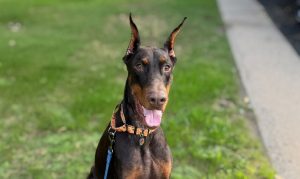Health & Vets
Doberman Health and Veterinarians in Arizona
You love your doberman, and want to bone-up on important health topics. Learn more here about:
DHDR Partner Veterinarians
Midwestern University Companion Animal Clinic – Glendale
623.806.7387 (PETS)
DC Ranch Animal Hospital – North Scottsdale
480.538.8300
623.979.0303
Acacia Animal Hospital – Tucson
520.308.4225
Suffolk Hills Pet Clinic – Tucson (Oro Valley)
520.742.1149
Prescott Valley Pet Clinic – Prescott Valley
928.772.6069
Rainbow Bridge Veterinary Services – At Home Euthanasia
602.448.3298
DHDR highly recommends Pet Insurance! Check out our partners who offer discounts to DHDR adopters and friends: HealthyPaws, and more to come.
When possible, DHDR also is grateful to work with:
Saguaro Veterinary Clinic – Scottsdale
480.948.1770
Soderstrom Veterinary Surgery/Neuro – Paradise Valley
602.329.2231
Arizona Veterinary Oncology – Gilbert
480.327.6690
Doberman Dog Food Recommendations
Desert Harbor Doberman Rescue always advises using www.dogfoodadvisor.com to research food for Dobermans. The Raw Feeding community on Facebook is also a great starting point if you are exploring raw. After starting your research, be sure to join our Facebook Group if you are looking for further discussion.
Doberman Health Topics & Helpful Links
The Doberman Pinscher, like every other breed, is susceptible to certain health issues. This doesn’t mean that your Doberman will necessarily have any of them. It means that the breed does see wobbler’s, bloat, DCM (Dilated Cardiomyopathy), cancer, von Willebrand’s disease, hip dysplasia, hypothyroidism, progressive retinal atrophy, and or blues and fawns color dilute alopecia (CDA). It is also important to understand if your Doberman is fit or fat.
Albino Dobermans have additional issues, which is why the Doberman Pinscher Club of America (DPCA) strongly discourages breeding them and bans them from conformation competitions. Albinism in Dobermans is not comparable to albinism in other breeds or species. In Dobermans, it doesn’t matter whether the dog is cream, whitish, or stark white, or whether its eyes are blue or pink or red. These coat colors in Dobermans mean that it’s an albino. Albinism in Dobermans is a genetic defect with often significant and painful health implications, including poor vision, photophobia (light intolerance) skin lesions, sun intolerance, and resulting skin cancer. The intense in-breeding required to produce more of them is also linked to troubling temperament issues. That is why it is unscrupulous and unethical to breed intentionally for albino Dobermans, and why DPCA opposes it vigorously.
However, all decent Doberman rescues do accept albino Dobermans. It’s not the fault of the dog that it’s an albino, after all. With proper screening and care, these individuals can be wonderful companion animals, but they should NEVER be bred. When DHDR accepts an albino, we try to find a home in a more moderate climate than Arizona because of these dogs’ serious sun sensitivity.
Make sure your vet is aware of the health issues known to affect Dobermans. For instance, before you consent to surgery for your Dobie, make sure your vet tests his or her clotting time. Some Dobermans have von Willebrand’s Disease, a form of hemophilia. Check online for lists of common Doberman maladies. Print one out for your vet, just to be sure.

